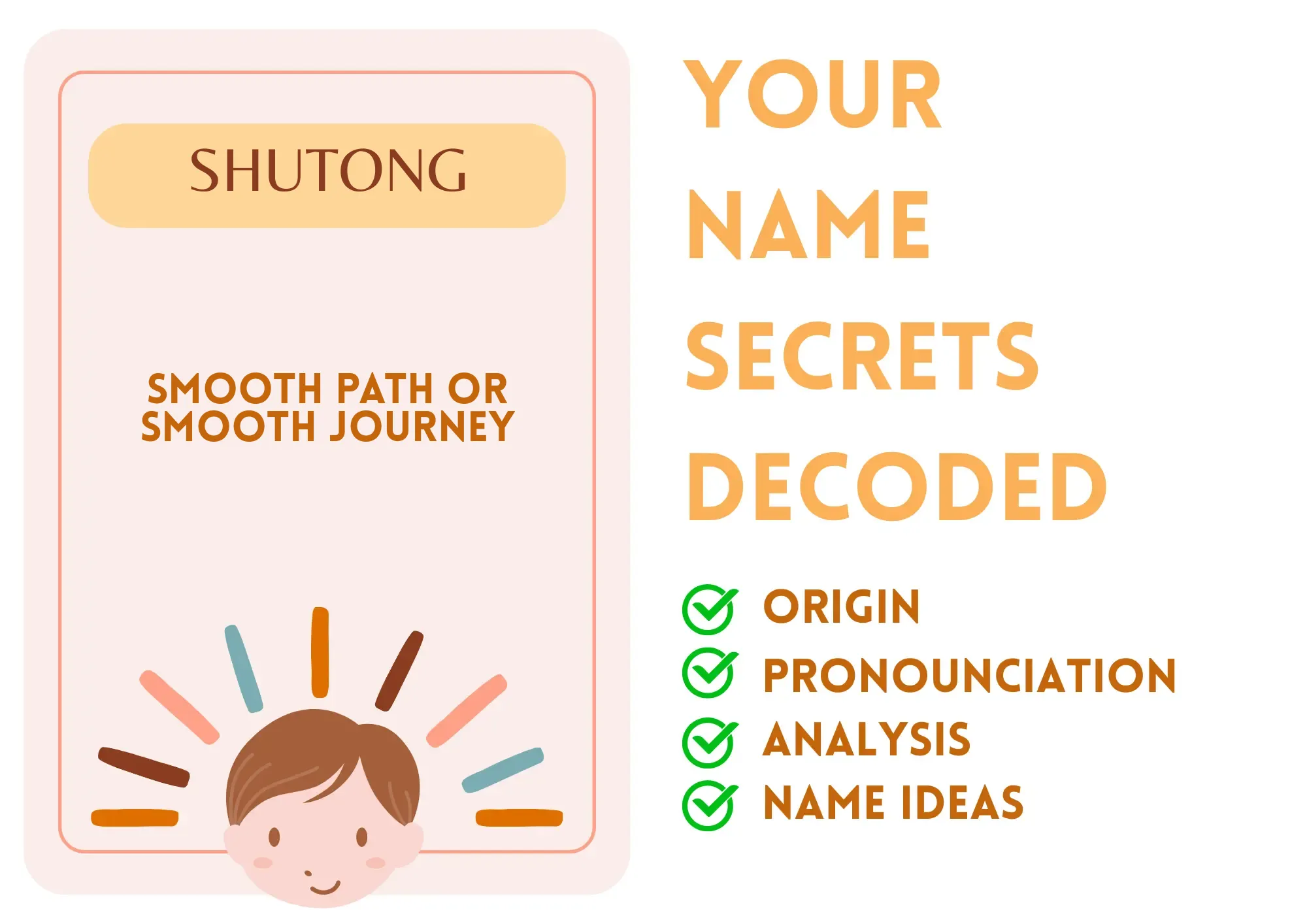
Shutong
Shutong is a name of Chinese origin, which translates roughly to 'smooth path' or 'smooth journey.' It is primarily used for males, though it can be considered unisex in some contexts. In Chinese culture, names often carry significant meanings, often related to nature or positive life aspirations.
Shutong is not very common outside of Chinese-speaking communities but is appreciated for its unique sound and significance. The name evokes feelings of ease and tranquility, reflecting the smoothness implied in its meaning.
In terms of writing and pronunciation, Shutong is straightforward. However, it may be challenging for those unfamiliar with the Chinese language, potentially leading to mispronunciations or misspellings. Common nicknames could be Shu or Tong. Overall, Shutong stands out for its strong cultural roots and positive connotations.
Basic Information
Gender: Boy
Sounds Like: SHOO-tong
Pronunciation Explanation: The first syllable is pronounced like 'shoe', and the second syllable rhymes with 'long'.
Summary and Meaning
Meaning: smooth path or smooth journey
Origin: Shutong has origins in China, specifically within Chinese linguistic and cultural contexts.
Usage: Shutong is traditionally a masculine name in Chinese culture but can sometimes be used for females.
Name Number (Chaldean)
Name Number (Pythagorean)
Popularity (Global Rank)
Overall: 118074
Boys: 54235
Most Popular in
Religious and Cultural Significance
Religion: Buddhism
Background: In relation to its origin, Shutong may be used in Buddhist contexts, representing a peaceful and smooth journey through life, aligning with Buddhist philosophies of tranquility.
Cultural Significance: Shutong carries a positive cultural significance, often desired for its aspirational meaning associated with a smooth and successful life journey.
Historical Significance: As a name reflecting positive traits such as smoothness and ease, Shutong can be linked to historical narratives in Chinese culture that emphasize harmony and balance in life.
Popular Culture
Literature and Mythology: While Shutong is not widely featured in mainstream literature, elements of its meaning resonate throughout Chinese philosophical texts that highlight peace and harmony.
Movies and Television: Characters named Shutong might appear in independent Chinese films focusing on personal journeys, growth, and discovery.
Feelings and Perceptions
Perception: Shutong is generally perceived positively, evoking associations with peace and a favorable life path. It is appreciated for its unique sound and meaningful implications.
Positive Feelings: Unique, peaceful, aspirational, serene, harmonious.
Negative Feelings: Relatively unfamiliar to non-Chinese speakers, potential for mispronunciation.
Practical Considerations
Ease of Writing and Calling: Shutong is straightforward to write in pinyin (using Roman letters) and relatively easy to pronounce for those familiar with the sounds. However, non-native speakers may find it challenging.
Common Typos and Misspellings: Shutong,Shuton,Shutongh,Shutun
Common Nicknames: Shu,Tong,Shu Shu
Shutong Popularity
Shutong Usage and Popularity By Country
| Country | Rank (Overall) |
|---|---|
| Hungary | 19137 |
| New Zealand | 20916 |
| Singapore | 24648 |
| Japan | 26195 |
| Canada | 26422 |
| Switzerland | 35738 |
| Australia | 42971 |
| United States | 49819 |
| United Kingdom | 51751 |
| Thailand | 60600 |
Shutong Usage and Popularity By City
| City | Rank (Overall) |
|---|---|
| Peking | 4505 |
| Shanghai | 5895 |
| Boston | 11569 |
| London | 29264 |
| Sydney | 18777 |
| Dallas | 21636 |
| Lexington | 3933 |
| Pittsburgh | 7455 |
| Vancouver | 12900 |
| Albuquerque | 4317 |
Compatibility Analysis
Famous Persons Named Shutong
No results found for Shutong.
Related Names
Similar Sounding Names:
Xitong,Shuying,Zitong,Yitong